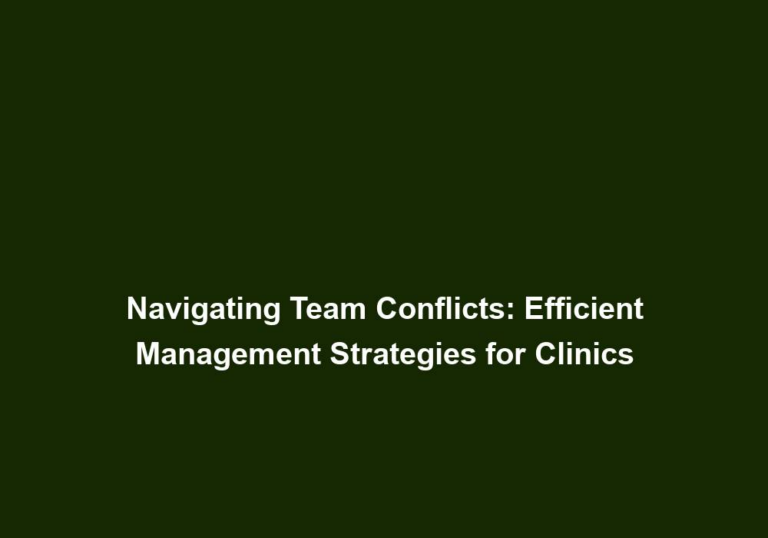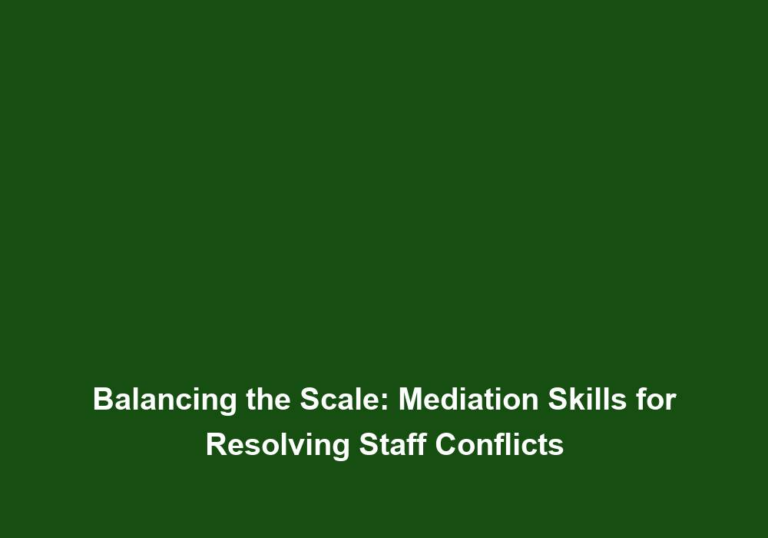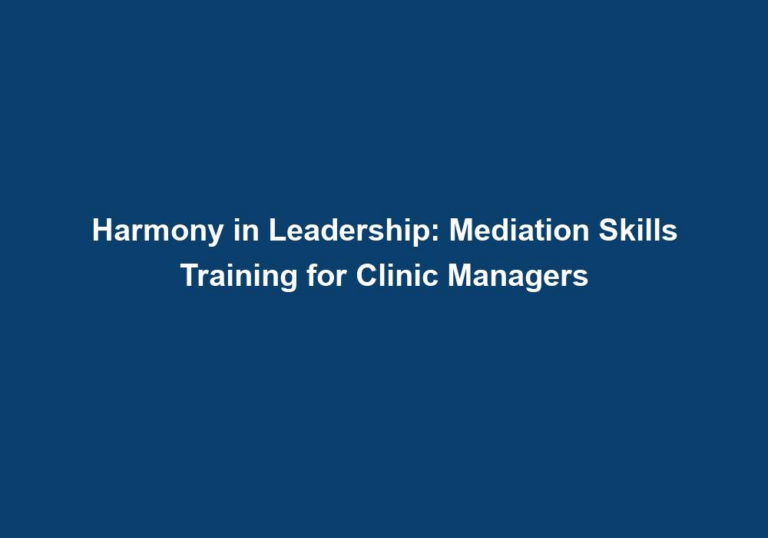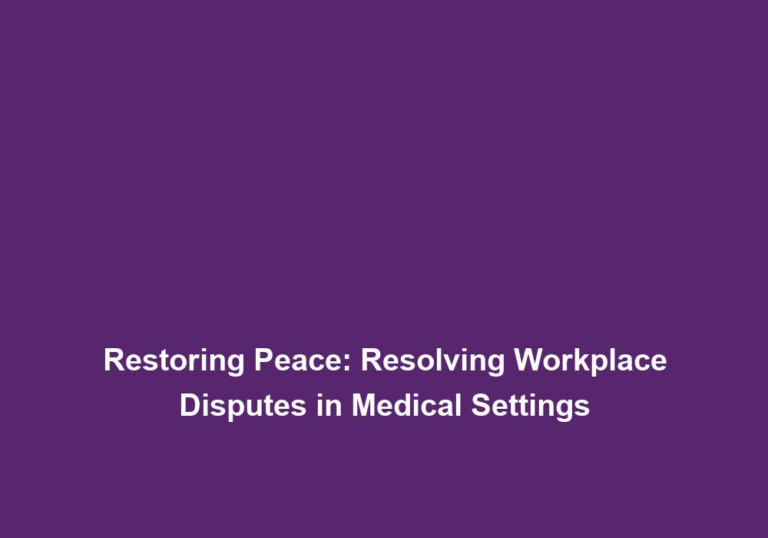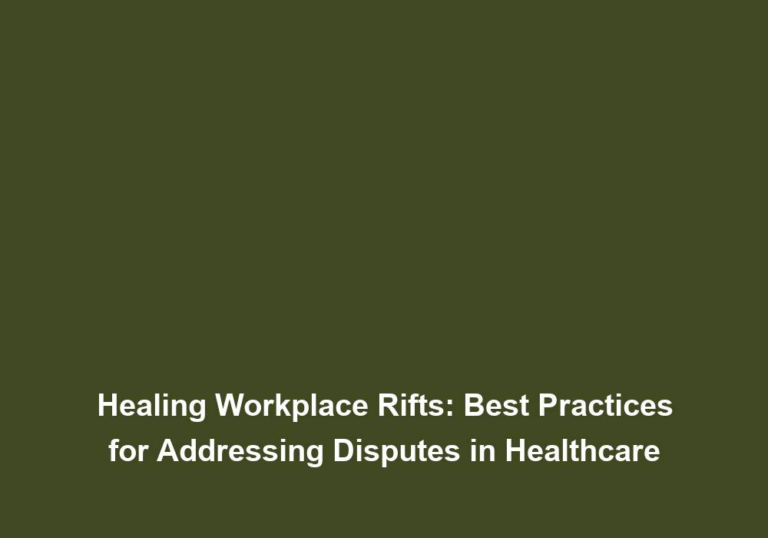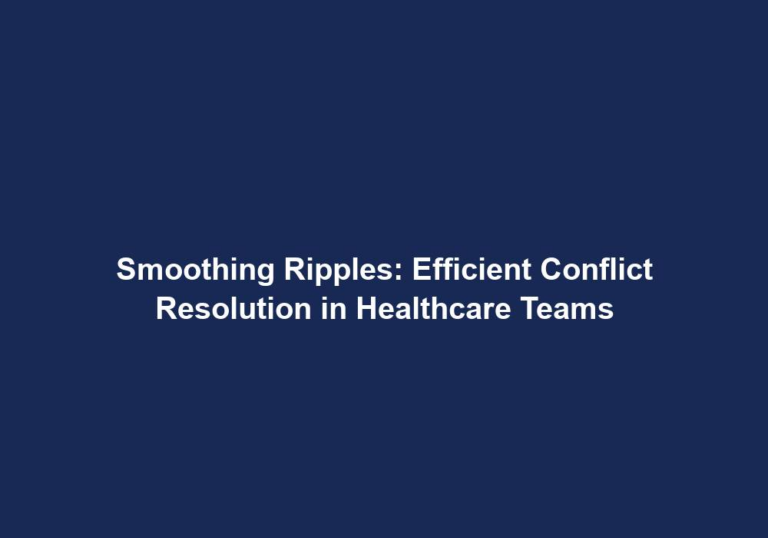Leading with Empathy: Mediation Skills Workshops for Healthcare Managers
In today’s healthcare industry, effective leadership is crucial for fostering a positive work environment and ensuring optimal patient care. Healthcare managers play a vital role in leading their teams, and one key aspect of successful leadership is the ability to handle conflicts and disagreements among team members. Mediation skills workshops provide healthcare managers with valuable tools to navigate and resolve conflicts, ultimately leading to enhanced teamwork and improved overall performance.
Introduction
In the healthcare industry, where collaboration and effective communication are vital, healthcare managers need to possess strong mediation skills to handle conflicts among team members. Mediation skills workshops offer a comprehensive training platform that equips healthcare managers with the necessary tools and techniques to address conflicts constructively. By attending these workshops, managers can enhance their leadership abilities and create a harmonious work environment that promotes both staff satisfaction and optimal patient care.
The Importance of Mediation Skills for Healthcare Managers
-
Improved Communication: Effective mediation skills enable healthcare managers to facilitate open and honest communication among team members. By creating a safe and supportive environment, conflicts can be addressed in a constructive manner. Mediation skills workshops teach managers active listening techniques and effective communication strategies that encourage team members to express their concerns, leading to better understanding and collaboration within the team.
-
Reduced Workplace Stress: Conflict within healthcare settings can significantly contribute to workplace stress and tension. Healthcare managers equipped with mediation skills can identify and address conflicts promptly, reducing stress levels and creating a more harmonious work environment. By providing a platform for open dialogue and resolution, mediation skills workshops empower managers to proactively manage conflicts, thus minimizing their negative impact on staff well-being.
-
Enhanced Patient Care: Conflict among healthcare professionals can negatively impact patient care. When conflicts go unresolved, it can lead to breakdowns in communication, decreased teamwork, and compromised patient outcomes. By mediating and resolving conflicts, managers can ensure that all team members work together cohesively, resulting in improved patient outcomes and satisfaction. Mediation skills workshops provide managers with the knowledge and strategies to effectively address conflicts, thereby enhancing the overall quality of patient care.
Key Components of Mediation Skills Workshops
-
Conflict Resolution Techniques: Mediation skills workshops cover various conflict resolution techniques, such as active listening, effective communication, and negotiation. These techniques empower healthcare managers to mediate conflicts impartially and find mutually agreeable solutions. Through role-playing exercises and case studies, managers learn how to identify the underlying causes of conflicts and guide team members towards resolution.
-
Building Empathy: Leading with empathy is crucial for healthcare managers when mediating conflicts. Workshops emphasize the importance of understanding others’ perspectives and feelings, enabling managers to empathize with conflicting parties and promote resolution. By learning to empathize with different viewpoints, managers can create an inclusive and supportive work environment that encourages collaboration and respect.
-
Mediation Process: Workshops provide managers with a structured mediation process to follow when addressing conflicts. This process typically includes pre-mediation preparation, facilitating the mediation session, and post-mediation follow-up. By following a systematic approach, managers can ensure fair and thorough conflict resolution. Mediation skills workshops provide managers with the knowledge and techniques to navigate each step of the mediation process effectively.
Benefits of Mediation Skills Workshops
-
Improved Leadership Abilities: Mediation skills workshops equip healthcare managers with valuable leadership abilities. By effectively mediating conflicts, managers can establish themselves as trusted leaders who prioritize open communication and collaboration. These workshops provide managers with the skills to address conflicts promptly and create an environment where team members feel heard and supported, ultimately enhancing their leadership capabilities.
-
Enhanced Team Dynamics: Conflict can significantly disrupt team dynamics and hinder productivity. Mediation skills workshops enable healthcare managers to address conflicts promptly, fostering a positive team culture built on trust, respect, and cooperation. By providing managers with the tools to navigate conflicts, workshops help create an environment where team members can work together harmoniously, leading to increased productivity and job satisfaction.
-
Reduced Employee Turnover: Conflict-ridden work environments often lead to increased employee turnover. By proactively addressing conflicts through mediation, healthcare managers can retain valuable team members, ultimately reducing turnover rates and associated costs. Mediation skills workshops provide managers with the knowledge and strategies to handle conflicts effectively, promoting a positive work environment that encourages staff retention and professional growth.
Implementing Mediation Skills Workshops in Healthcare Organizations
-
Assessing Organizational Needs: Before implementing mediation skills workshops, healthcare organizations should conduct a thorough assessment of their team dynamics and conflict management practices. This assessment will help identify specific areas of improvement and tailor the workshops accordingly. By understanding the unique challenges and dynamics within the organization, workshops can be customized to address the specific needs of healthcare managers.
-
Engaging Professional Mediators: To ensure the effectiveness of workshops, healthcare organizations should consider engaging professional mediators with expertise in the healthcare industry. These mediators can provide valuable insights and facilitate meaningful discussions during the workshops. By bringing in external experts, organizations can benefit from their experience and industry-specific knowledge, enhancing the overall quality and impact of the workshops.
-
Ongoing Training and Support: Mediation skills development is an ongoing process. Healthcare organizations should provide continuous training and support to managers, reinforcing their mediation skills and ensuring they stay up-to-date with the latest conflict resolution techniques. This can be achieved through regular workshops, mentorship programs, or access to online resources. By investing in ongoing training and support, organizations can foster a culture of effective conflict resolution and continuous professional growth among healthcare managers.
Conclusion
Leading with empathy and possessing effective mediation skills are essential for healthcare managers to foster a positive work environment and promote optimal patient care. Mediation skills workshops provide managers with the necessary tools to address conflicts, enhance communication, and improve team dynamics. By investing in these workshops, healthcare organizations can create a culture of collaboration and empathy, leading to better outcomes for both staff and patients. Through improved leadership abilities, enhanced team dynamics, and reduced employee turnover, organizations can achieve higher levels of performance and patient satisfaction.


